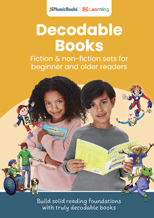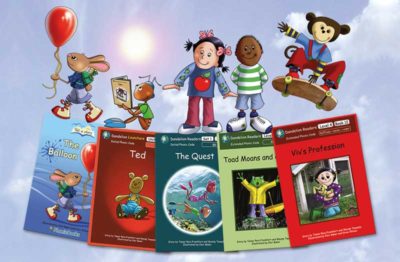The Short Version
Our decodable books have been validated in line with the latest guidelines following the DfE announcement that it is to retire the Letters and Sounds programme. You can order online. To get started, please choose from the two categories below or continue reading for further information.
What changes have been made?
In April 2021 the Department for Education (DfE) took three key steps regarding systematic synthetic phonics (SSP) teaching programmes:
- It published the revised core criteria for effective SSP teaching programmes.
- It launched a new process to validate complete SSP teaching programmes.
- It announced that it is ‘retiring’ the ‘Letters and Sounds’ programme and asked publishers to submit their phonics programmes for revalidation.
So, what does this mean for schools using ‘Letters and Sounds’ or those looking to change their programme?
In short, you don’t need to make any drastic changes to your programme or approach now or at all. No changes are needed, so long as it is shown to be effective and providing good results for all pupils - including the most disadvantaged. It is not mandatory to use a validated programme.
If a school is struggling to provide a successful SSP programme it can choose to receive support from a Phonics Hub or choose a validated programme to follow. A full list of validated programmes will be published in spring/summer 2022 once the validation process is complete.
What about decodable books?
Decodable books are an integral part of any phonics programme or approach. They provide practice for the phonics taught in the lesson and are now a mandatory part of the National Curriculum. Schools will need to show that the decodable books they are using are indeed decodable. (You may be surprised to hear that not all ‘decodable’ books are truly decodable!) Schools will also need to show that they support the progression of their phonics teaching (Grapheme/Phoneme Correspondences – GPCs).
Does my school need to purchase new decodable books?
No, it doesn’t. However, any decodable books you are using should support your phonics teaching. This means that children have been taught the letter/sound correspondences BEFORE they read the books.
How can I use the decodable books I already have?
There are two steps to using decodable books so that they support your teaching:
- Make sure that you know the phonics progression you are teaching.
- Make sure you align the decodable books with that progression accurately.
Have Phonic Books decodable books been validated?
Yes, our books were previously approved by the DfE in 2013. In 2021, they were resubmitted and have been validated for use with the Sounds-Write programme and more recently with McKie Mastery Power Phonics.
Do we need to follow a specific SSP programme to use these books?
No, you don’t. Simply align our books with the phonic progression you are teaching. But do ensure that children have been taught the letter/sound correspondences BEFORE they read the books.
Our books are widely (and very successfully) used by schools that follow various programmes and approaches. These include both ‘Letters and Sounds’, and Sounds-Write.
Why should I choose Phonic Books for our decodable books?
Phonic Books decodables were created by three dyslexia and reading specialists. This means the books are backed by more than 89 years of relevant experience. Here are just some of the books’ benefits:
- They are truly decodable with a gradual introduction of high frequency or tricky words
- They can be used with any phonics programme
- They are highly structured, with a steady, cumulative progression, so that all children can learn to read
- Each book has the graphemes (spellings) clearly printed on the front cover – to help you match the books to your phonics teaching
- Each book has the phonic sequence and scope of the series clearly presented – to help you plan how you will match the books to your phonics programme
- They are designed to engage and motivate beginner readers
- There are multiple books at each stage of the progression to ensure sufficient reading practice
- They are complemented by easy-to-use workbooks for further reading support
- Phonic Books also offer a unique range of age-appropriate, exciting books for older, struggling readers who need more practice
Need more information?
- Understand the progression of our books
- Download our catalogue
- Sign up to our newsletter for occasional updates and promotions
- Any questions? Contact us



